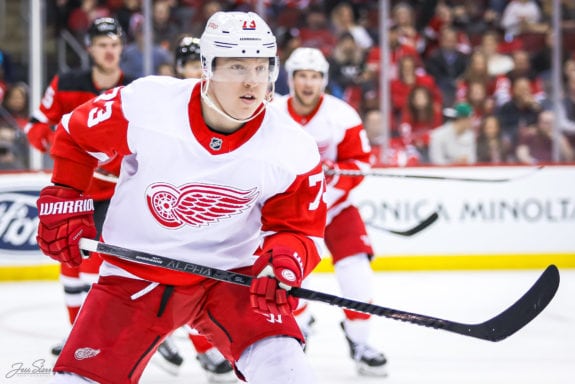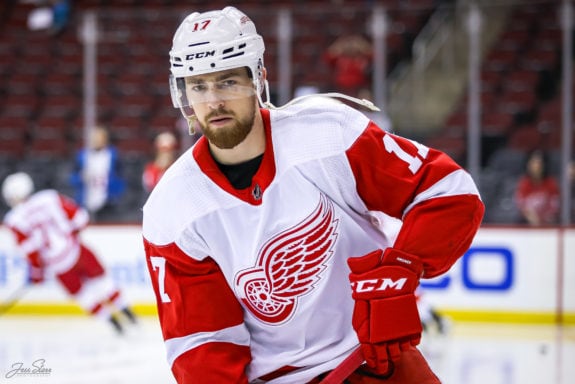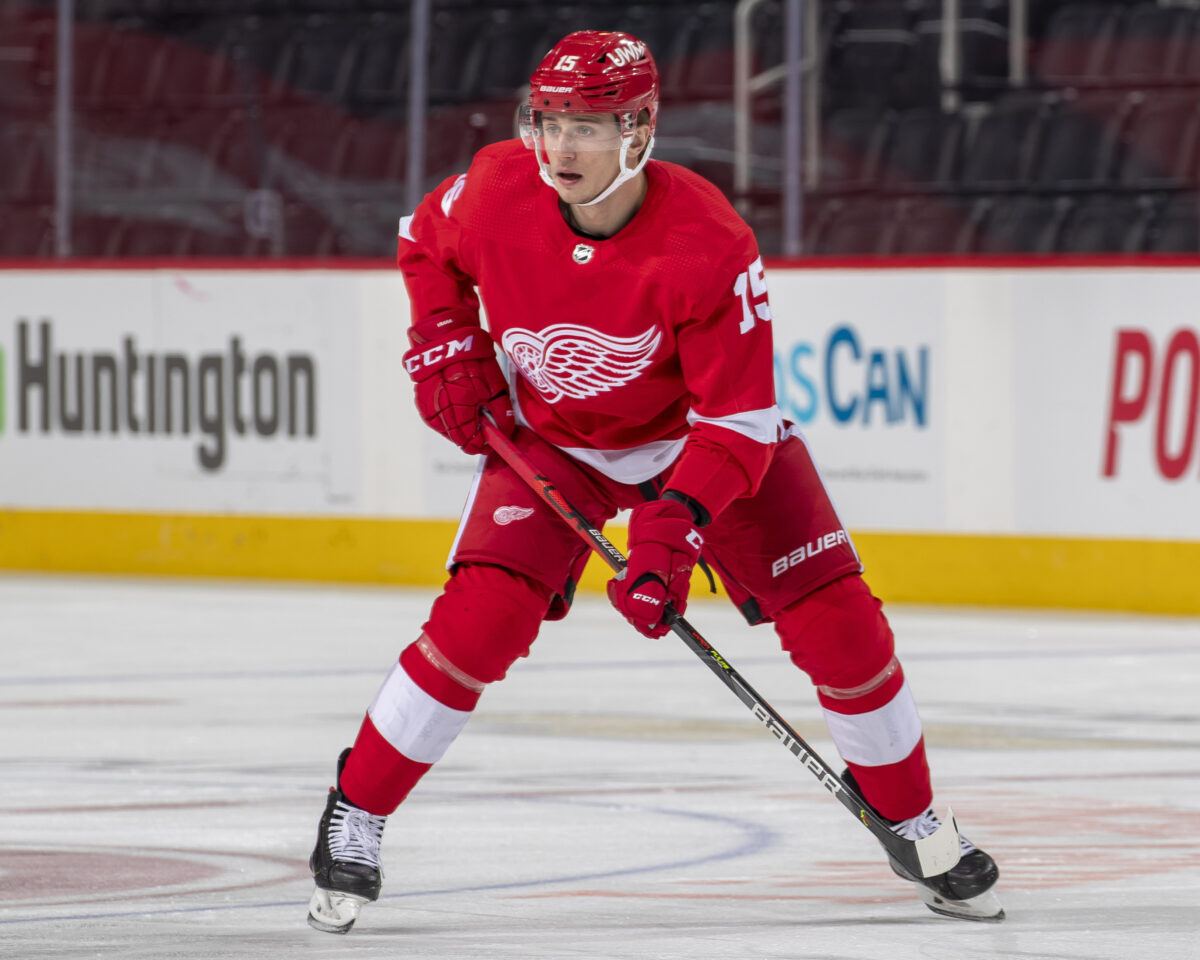This summer, Steve Yzerman and the Detroit Red Wings have several restricted free agents (RFAs) in need of new contracts, including Filip Hronek, Tyler Bertuzzi, and newly acquired Jakub Vrana.
When negotiating new deals, Yzerman and each player’s representation will need to consider a handful of variables. Talking points go beyond counting stats and comparables – advanced analytics can often be leveraged to make a case in either direction. The flat salary cap complicates matters as well.
In addition, there are economic variables in play. Supply and demand with cap space, roster spots, and player roles can also have an impact on contract negotiations.
All this to say, Yzerman is going to be busy this summer once again. With these variables in mind, here are my projections for the contracts that Detroit’s RFA will ultimately agree to this offseason.
Red Wings Likely to Receive Qualifying Offers
Expect Yzerman to dish out a few qualifying offers over the next couple months. A qualifying offer is a one-year contract with a slight raise – the amount of which depends on the prior year’s base salary. Players can either accept the deal or hold out for a better one.
Due to their lack of leverage, seven Red Wings players are likely in line for qualifying offers. They’re noted below with their expected offer amount.
- Michael Rasmussen – $874,125
- Evgeny Svechnikov – $917,831
- Dennis Cholowski – $874,125
- Gustav Lindstrom – $750,000
- Givani Smith – $750,000
- Chase Pearson – $874,125
- Hayden Verbeek – $750,000
Of the players listed above, only Pearson and Svechnikov stand out as potential wild cards. Pearson is eligible for arbitration, so he could challenge the Red Wings for more money. But given the fact that he hasn’t appeared in a single NHL game, it’s unlikely that he does so.
The other is Svechnikov, who cleared waivers twice last season. There’s a chance that the Red Wings do not tender him a qualifying offer, making him an unrestricted free agent (UFA). If the organization risked losing him for nothing twice this season, Svechnikov likely doesn’t have a future in Hockeytown. Declining to qualify him would sever ties once and for all.
Raise Coming for Adam Erne
Who saw Adam Erne co-leading the Red Wings in goals this season? I certainly didn’t. Luckily for Erne, this offensive outburst likely propels him toward a raise.

Based on his age, value, and role within the lineup, I’m projecting a two-year contract with a $1.6 million AAV – a 60.4 percent raise from his 2020-21 salary. This rewards Erne for his development and maintains Detroit’s salary cap flexibility.
Ryan Hartman recently signed a three-year, $1.7 million AAV contract with the Minnesota Wild and the ink on Conor Sheary’s two-year, $1.5 million deal with the Washington Capitals just dried as well. These two players serve as the best comparables for my proposed Erne contract given their age and respective roles.
Related: Red Wings Improved in 2020-21 – But by How Much?
Red Wings Have Options with Filip Hronek
When it comes to Hronek’s next contract, the Red Wings have a couple of routes to consider.
First, they could offer him a two-year bridge deal and re-evaluate his value (plus the team’s financial health and competitiveness) in the near future. If Hronek continues to grow over the next two seasons, his second big boy contract could come with a much higher AAV. But if he plateaus, the Red Wings are not locked into an expensive contract for years to come.

An alternative would be to sign the defenseman to a long-term deal now. This option would come with a higher cap hit (relative to a bridge deal), but would offer both parties stability over the next six-to-eight years. Plus, the AAV would likely be less than any post-bridge contract Hronek agrees to.
All things considered, I’m projecting that Hronek signs a bridge deal somewhere in the neighborhood of two years at $3 million per season. Ryan Lindgren, MacKenzie Weegar, and Erik Cernak all signed similar deals and are in Hronek’s age/talent cohort. This is a 320 percent raise for Hronek and gives him the opportunity to play himself into a more lucrative deal.
THW colleague Devin Little offered a different perspective and projected a long-term contract for Hronek.
Baby Steps with Jakub Vrana
To me, Vrana’s next contract is rather simple. Negotiations may prove different, but there’s one logical path that the Red Wings and Vrana’s representation can take this offseason.
Before coming to Detroit, the Czech winger was having an off year (for his standards) with the Washington Capitals. He didn’t seem to mesh with new coach Peter Laviolette. But then the trade to the Red Wings reinvigorated Vrana – he produced 11 points in as many games playing top-six minutes.

So when you consider a subpar season in D.C. and a small sample size in Detroit, a long-term contract doesn’t make a lot of sense here. Instead, the Vrana and the Red Wings would benefit from a one-year, $4.25 million contract for the 2021-22 season. That way, Vrana has the opportunity to show management that he deserves a long-term deal as one of Detroit’s core players.
In this circumstance, Vrana would be an RFA once again next offseason. In addition, the Red Wings would have a better understanding of how he fits into the big picture.
As with Hronek, Devin put together his own Vrana deal(s).
Long-Term Deal for Tyler Bertuzzi
This contract is a bit more complicated than the rest. Bertuzzi missed most of the 2020-21 season with a back injury that ultimately required surgery. He’ll also be a UFA next summer, so the Red Wings can’t run it back with another one-year deal.
Because of these factors, I believe a four-year contract with a $4.375 million AAV is in everyone’s best interest. Here’s how the deal would break down:
- Year 1: $3.5 million
- Year 2: $4.5 million
- Year 3: $4.5 million
- Year 4: $5 million
In essence, the first year of this contract would be a mulligan for the 2020-21 season. Seven points in nine games is great, but there isn’t enough evidence to warrant a raise – especially in a flat salary cap environment. So the Red Wings and Bertuzzi get a do-over.
The final three years of the contract pay Bertuzzi like a second-line player. It will also allow both sides to re-evaluate at critical junctures – Bertuzzi will be 30 when the deal expires and the Red Wings should be a playoff team on the rise in 2025.
Related: Red Wings Grades: Who Passed & Who Failed in 2020-21?
Final Word
With the contracts I projected, the Red Wings will have $49,960,846 committed to 17 skaters, one goalie, and Justin Abdelkader’s buyout. (Pearson and Verbeek are excluded; Moritz Seider is included.) That leaves $31,539,154 available to sign free agents, acquire bad contracts, or simply save for the future.
Even if Yzerman signs Bertuzzi, Erne, Hronek, and/or Vrana to more lucrative deals, the Red Wings are in great shape financially. And as we’ve seen over the past year, salary cap flexibility is a huge plus for any organization.